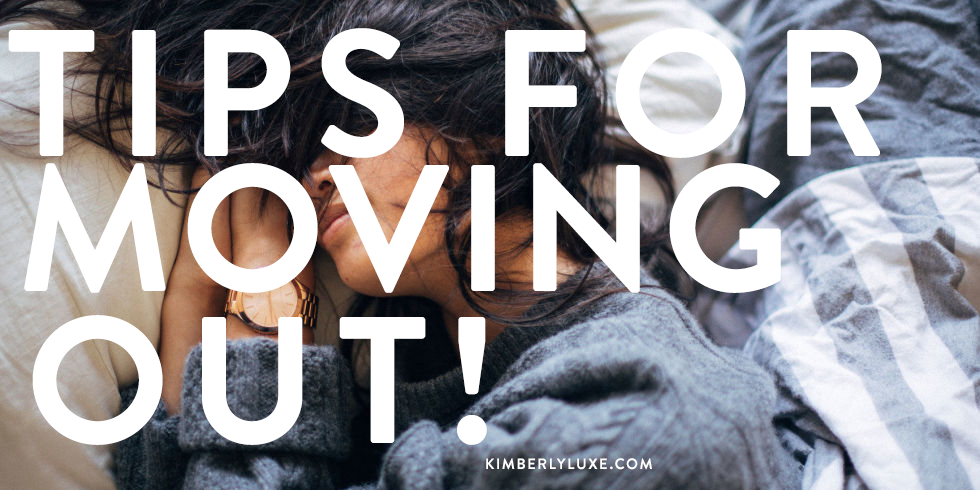
Why didn’t anyone tell me?
Moving out is tough work, but it can be a lot easier if you’re well prepared before taking the big leap.
You’ll thank me later. If you’re currently living with your parents and aren’t responsible for paying many bills then keep in mind that this might just be the very last time that you’ll ever be able to save large sums of money. Take advantage of this and promise yourself that you won’t move out until you have 4, 5 or 6 months of rent saved up. This will allow you to continue saving even after getting your new spot and won’t make you a victim of the check-to-check lifestyle. Allow me put this into perspective for you. Let’s say you make $1,000 a month from your job. And your rent is $500 per month. This would mean that one out of two of your checks will automatically have to go to your rent. And the remaining $500 that you’re left with will still have to cover cable, power, water, trash/sewage, groceries, gas, car insurance, renter’s insurance and/or a car payment. Before the month ends, you won’t even have money to do anything fun and you’ll be right back where you started – turning in a check to your apartment-complex and divvying out the following check to all of the other companies you owe. And trust me when I tell you – you don’t want to be on this road because the amount of stress you’ll feel just won’t be worth it. My suggestion: save up 4-6 months of rent before moving out and then set up your direct deposit to automatically filter “half” of what your rent is into a savings account each month. Example: Your $500 rent is already paid for in January, February, March & April because you saved before moving in. But you want to be proactive so you have $125 direct deposited into a savings account each check (or $250 each month) from January-April. By the time May comes around, you’ll have enough rent to cover May and half of June and this will continue until you’re ready for your lease to end.
Let’s be honest. Having roommates isn’t the ideal situation, however, for those under 25, I truly recommend it! Not only will it allow you to save money but it’ll also help you to better understand what it is you want out of a place. When I first was looking for a first apartment, I knew that I wanted something that was “new construction”. (Tip: Moving into a place that is new construction could ensure that you’ll get great rates. When apartments are new and looking to fill, they often offer promotions like first month free or no application fees in order to get people in the door. This means you’ll get the best rates and save more money in the overall picture then you may at a place that is well established and full-to-capacity.) At this point of my life though, naturally, I also knew that I was going to have roommates – I was in college, away from home and transitioning from dorm to apartment-living, and I didn’t even know I was adult-enough to live on my own. Our rent was $850 for a brand-new three-bedroom apartment with vaulted ceilings. $850 divided by us 3 gals meant we each paid $283 per month which was absolutely insane! I wouldn’t trade that experience or my decision to have roommates at all. Of course, we all ran into issues here and there but in the 2 years we lived together, those 2 little issues were nothing! It’s was the same as being at home with family :).
Just because you don’t have the best credit doesn’t mean you won’t be able to find a place. A few things that you can consider doing are the following. (A) Ask your parents to be on the lease with you. In most cases apartment complexes won’t let you have a “guarantor” (or co-signer) if your credit reflects a horrible credit past. In those cases, the apartment complexes will ask that your parent’s sign on as a roommate (or the main tenant) so that they have more responsibility if you fail to make a payment. This also means that your parent(s) will get keys to your place, access to your place whenever they please, etc. If you don’t want your parent’s signing for you then your next option will be to (B) move in with a friend/family member that is looking for a roommate. However, do note that without having a strong-lease you may be asked to leave at any time and you’ll have to refer to the tenant-laws of your state/county in order to better understand your rights. Another option that you may have is to (c) find income-based housing and/or places that don’t require such a high score to move in. It’s a good idea to disclose your credit score and history to the leasing agent BEFORE having them run your credit, this way, you can get their opinion on whether or not they believe you’d be approved to move in.
If you aren’t much of a TV watcher, then networks like Netflix, Amazon Prime Video or HULU may save you $80-$100 a month!
You’d be surprised how many places include water, sewage and sometimes even cable and internet. Often these bundled-rates save you more monthly.
Sometimes if it sounds too good to be true, it is. Read online reviews from people who have lived at the residences you’re considering and also be sure to take an in-person tour to make sure that the pictures online match the actual product.
It surely isn’t cheap. Perhaps your mom has an extra bedroom set, or your cousin has a couch she’s giving away. Don’t be afraid to ask if you can take them with you! One less expense.
Consider your payment history as a report card for all future places you move into. Also, ask your apartment complex if they report your payments to any credit bureaus (and which ones). If they do, this might help you improve your credit score (if you consistently pay on time)!
So if you feel like the rent is already a little steep, remember that it’ll be steeper once you resign your lease. Often, $25-$100 or a percentage more which can add up.
Like nails twice a month, hair, waxes, eating out, etc.
Note: For the sake of being realistic, I’m not using the numbers from when I had 2 other roommates, just the time when I had only 1 other roommate. Also this is how much my portion of the bills cost. We split everything 50/50.
+ Rent ($450)
+ Cable & Internet ($65)
+ Water (included in rent)
+ Trash & Sewage ($25)
+ Renter’s Insurance ($15)
Total: $555











